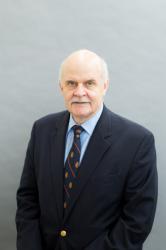Today marks 13 years since the passing of the Reverend Edmund A. Opitz, pastor, author, and great supporter of the Acton Institute’s mission. On February 1, 1999, Rev. Opitz sent a letter to Leonard P. Liggio (1933-2014) and to me. We were both founding trustees of Acton, which at the time was not yet ten years old. Many friends in the freedom movement, including Father Robert Sirico, Acton’s co-founder, started attending programs conducted by Ed Opitz at the Foundation for Economic Education. Those programs, in a way, were similar to those conducted by the Acton Institute during our early years.
Once Acton was founded, we often hosted Ed Opitz as speaker and participant. In addition to his music talents, he also delved into “magic,” entertaining us in the evenings with amazing tricks. He was so fond of Acton that he donated his library of about 2,500 volumes to the organization.
His letter records correctly that I first met him on June 4, 1979, after my initial attendance at Grove City College. He gave me a copy of his book Religion and Capitalism: Allies, Not Enemies, which was published in 1970 and served as guide for many of us. In this book he stressed that “Christianity implies a free society and limited government, with economic affairs organized in terms of the market. Biblical religion inculcates a concern for justice between men while also stressing individual freedom of choice and personal commitment.” For those interested in the writings of this Congregational minister, who was also founder of The Remnant, I recommend the collection of essays published in Religion: Foundation of the Free Society, by the Foundation for Economic Education, FEE, in 1994.
Opitz wrote that the “free economy—or economic liberty—is an idea at the same level of importance as free speech or freedom of the press.” He saw a free economy as providing for “the efficient allocation of the planet’s scarce goods so that human wants are met in order of their urgency, and with a minimum wastage of time, energy and resources.”
Fr. Robert Sirico wrote of Opitz, “Never to be mistaken for an ‘economic fundamentalist,’ much less a theocrat of any variety, Ed was always careful to note that Christianity qua Christianity offered no specific economic model any more than economics qua economics has any specific moral model to proffer — which is precisely why they both need each other.”
It is an enormous privilege that thanks to the support of many, and the talented work of the Acton team, we have been able to carry on Ed Opitz’s work and take it to almost every corner of the globe.
A biographical sketch of Rev. Opitz can be read here.
(Homepage photo credit: Acton Institute).

